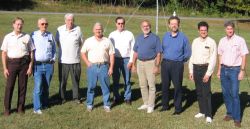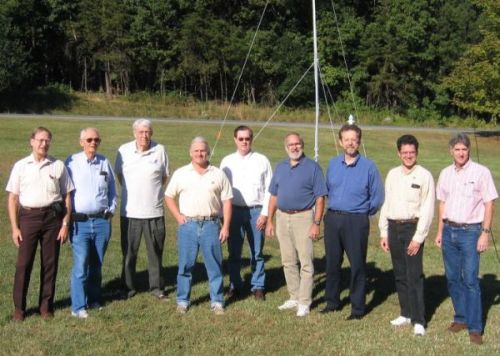The Annual SARA Conference this year will feature the core Radio Jove team as the keynote speakers. Read below to find out more about the team and the formation of Radio Jove.
The Radio JOVE Project - Shoestring Radio Astronomy
Dr. James Thieman
 Can students learn basic radio astronomy for $100? That was the main question asked by a group of friends from the University of Florida more than ten years ago. At that time the group got together at Goddard Space Flight Center, inviting a few others who were also interested in radio astronomy, and formulated a project to test that basic question. The project was named Radio JOVE, using the alternate name of the god Jupiter, since a number of us had studied the planet Jupiter in radio astronomy research at the University of Florida. Jupiter would be a main focus for the project as one of the most interesting radio sources in the sky at the decameter wavelengths (3-30 MHz frequencies) that would be studied. The capital letters JOVE are often used, not as an acronym, but to suggest a radio station call sign just as an additional reminder of the part of the spectrum being studied. (Indeed there is or was a radio station JOVE in Spain, or so we were once told.)
Can students learn basic radio astronomy for $100? That was the main question asked by a group of friends from the University of Florida more than ten years ago. At that time the group got together at Goddard Space Flight Center, inviting a few others who were also interested in radio astronomy, and formulated a project to test that basic question. The project was named Radio JOVE, using the alternate name of the god Jupiter, since a number of us had studied the planet Jupiter in radio astronomy research at the University of Florida. Jupiter would be a main focus for the project as one of the most interesting radio sources in the sky at the decameter wavelengths (3-30 MHz frequencies) that would be studied. The capital letters JOVE are often used, not as an acronym, but to suggest a radio station call sign just as an additional reminder of the part of the spectrum being studied. (Indeed there is or was a radio station JOVE in Spain, or so we were once told.)
Dick Flagg had worked at the University of Florida as an electrical engineer, creating, developing, and operating much of the equipment used in the UF research. He had since retired and moved to Hawaii but still liked to keep his hand in on various radio projects. Together with the others, he asserted he could create a radio astronomy telescope kit that could be sold for no more than $100 for students to build and learn the basics of radio astronomy. Many others such as Prof. Tom Carr (one of the founders of radio research at the University of Florida), the late Ron Parise (astronaut), Jaydeep Mukherjee (Florida Space Grant Director) would contribute to this development through helping with the antenna design, creating software for data plotting, providing funding, writing manuals and instructional materials, and building websites and archives for the project. It was agreed we would emulate the already successful nonprofit INSPIRE project in which radio astronomy receiver kits were being sold for amateur study of the Earth's natural and manmade radio emissions in the kHz range. Indeed, Bill Pine, a high school physics teacher in Ontario, California and the distributor of INSPIRE kits, agreed to be the distributor of Radio JOVE kits if we could get the project successfully started. He, INSPIRE co-founder Bill Taylor, and INSPIRE supporter Jim Green provided essential advice and assistance that made the effort feasible.
The main problem was how to get the money to start the project. We decided to apply for a Director's Discretionary Fund grant from Goddard Space Flight Center. These grants were for projects that were considered risky and might not result in success. Jim Thieman served as the leader of that effort. We received sufficient money to finish the development of the telescope and to purchase enough parts for 100 kits. We had decided to give away the first ten kits to beta testers, but the other kits would be sold at half price, $50 apiece, as an incentive to get the project started. After the first 100 kits the $100 cost for follow-on kits would be sufficient to purchase more parts and keep the project going on a self-sustaining basis. This seems to work since we have recently distributed our 1400th kit. The kits have been sent to nearly all of the United States and more than 60 countries around the world. Of course costs of the parts went up over the years and extra items were added to the kits, so we now sell the kits for $190 plus shipping. We believe it is still a great bargain.
Further information about Radio JOVE will be presented at the SARA Conference in Green Bank in the summer of 2010. We have a great team that keeps the project running, mostly through volunteer services. The core team members and a little information about each are listed below.

The JOVE Team from left to right, Jim Thieman, Wes Greenman, Dick Flagg, Jim Sky, Jim Gass, Bill Pine, Jim Green, Len Garcia, and Chuck Higgins.
Dick Flagg - (RF Associates, Inc.) - Electrical engineer who created and developed the RJ1.1 receiver and JOVE spectrograph. He continues to provide expert advice on the building of the kits and troubleshooting of the problems our participants run into. Dick also maintains the Windward Community College Radio Observatory (WCCRO), one of the professional observatories linked to Radio JOVE.
Len Garcia - (Goddard Space Flight Center) - Radio astronomer, editor of the JOVE Bulletin and curator of the JOVE archive. Len created and maintains the software for the archive. He also created a museum kiosk that teaches about the radio sounds of Jupiter, the Sun, etc. especially for those with visual and audio impairments.
Jim Gass - (Goddard Space Flight Center) - Computer scientist, Radio JOVE webmaster and curator of the web site and the main instructional CD. He once was the creator and curator of the first NASA website.
Wes Greenman - (University of Florida, retired) - Electrical engineer, main parts orderer, and assembler of the kits for distribution. Wes helps to maintain the University of Florida professional radio astronomy facility.
Chuck Higgins - (Middle Tennessee State University) - Associate Professor of Physics and Astronomy and distributor of the Radio JOVE kits. With the help of his students Chuck does final assembly and packing of the kits, handles the orders and payments, and distributes them worldwide.
Francisco Reyes - (University of Florida) - Associate Scientist and Director of the University of Florida Radio Observatory (UFRO). Francisco also oversees the microwave link from the observatory to the UF campus that enables internet distribution of the signals.
Jim Sky - (Radio-Sky Publishing) - Creator and developer of the Radio-SkyPipe and spectrograph software - the heart of Radio JOVE data collection. Jim also created the Radio-Jupiter Pro software that enables predictions of Jupiter radio emission high probability times. He also designed and programmed the digital circuitry for our
spectrographs at the WCCRO and UFRO.
Jim Thieman - (Goddard Space Flight Center) - Radio Astronomer, Data Systems Manager, and manager of the Radio JOVE project. Jim arranges telecons for the staff and the Radio JOVE participants and coordinates the internal activities and external interfaces with other education and outreach organizations.
We often receive help from many other individuals, too numerous to name, whose assistance has been invaluable for the continuance of our operations.
We hope to have as many of the core team as possible at the SARA conference to present more about Radio JOVE and where we hope to go in the future. Come and learn more about the project and the group this coming July!
